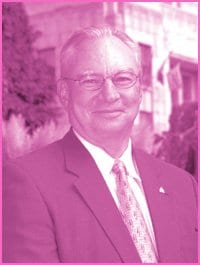The event itself made history. The rest, as they say, was icing on the cake.
A Feb 10 forum on the 2010 Olympic Games referendum was the first time in memory that city hall has publicly treated the queer community as a specific community of interest.
Held at Sugar Daddy’s in the heart of the West End, the event drew the mayor and two queer city councillors, in addition to two official boosters of the Games. Approximately 60 gays, lesbians, bisexuals and transgendered showed.
Bookseller Jim Deva, who organized the event, said he hoped it would be the first “of many forums where [the gay community] contributes to the fabric of the city of Vancouver.”
The meeting followed a COPE pledge in last fall’s election to involve the gay community in municipal policies that affect it.
Mayor Larry Campbell encouraged the gay to tell city hall and game organizers what it wants in exchange for supporting the Olympics in the Feb 22 plebiscite. “How do you want this area to grow?” he asked. Other communities are doing the same, and the results will be released this week in a report designed to make sure the city benefits from the Games, said Campbell. “What are we going to get out of this over the next seven years?”
Several participants had specific suggestions of what the gay community could demand:
a plan to renew “our poor, beleaguered Centre”;
converting the athlete’s village to a low-income queer retirement home after the Games;
support for the Pride Parade and other gay festivals;
a fully-funded strategy to promote Vancouver internationally as a gay tourism destination;
protect gay bathhouses, bars and other queer spaces from redevelopment or police harassment;
no displacement of low income residents to provide hotel space for Olympic visitors;
rent controls to protect the integrity of the West End and Commercial Drive as viable queer communities;
measures to ensure the safety of the gay community;
allowing bars to stay open to 4 am and improving late-night bus service.
A majority of gay community members spoke in opposition to the Olympics. One youth activist cited a litany of provincial cutbacks to health and social services, including many that hurt queers.
Activist Chris Morrissey asked “who are the real winners?” if Vancouver’s bid succeeds. Mayor Campbell is asking “what are the crumbs that we can get as they fall from the table?” said Morrissey. “The Olympics are about big business, TV contracts, big-dollar bidders. The priorities are all wrong. Are we saying that the end justifies the means?”
Ellen Woodsworth said the Olympic bid committee’s estimate of costs for marketing, security and athlete’s housing are unrealistically low. The lesbian city councillor says she cannot vote for the Olympics given her skepticism about the actual costs and with the provincial government downloading social costs onto the city.
But Mayor Campbell warned that voting down the Olympics will not cause the provincial Liberals to spend Games money on social programs. And people who want to register their protest against provincial cuts should take it out on Gordon Campbell’s government in the next provincial election rather than vote against the Olympics, he said. The mayor insisted that the city will get at least $30 million from senior governments that it will not get without the Olympics.
That federal and provincial money would pay for an arena, housing and other facilities that the city would otherwise have to pay for.

 Why you can trust Xtra
Why you can trust Xtra


